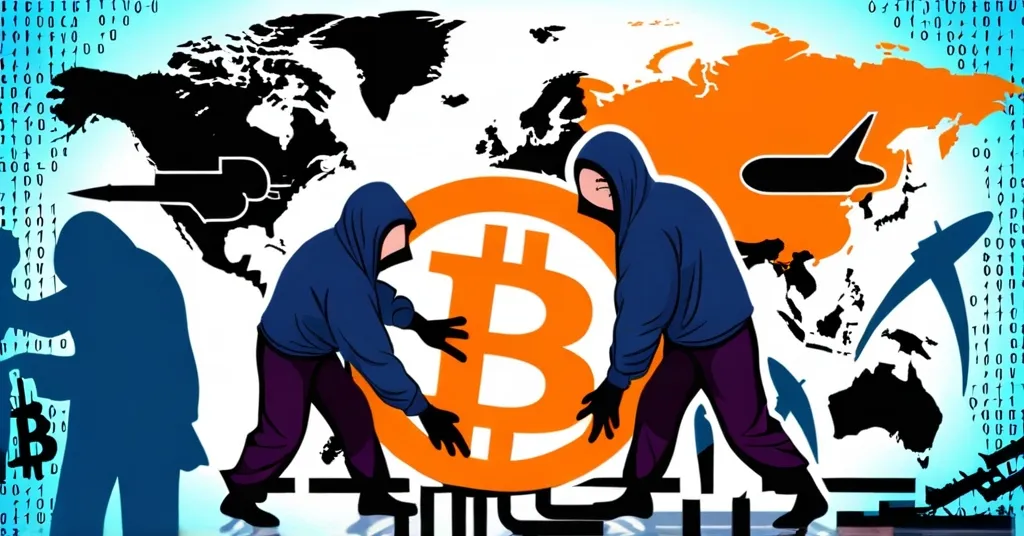North Korean Hackers Steal $1.34B in Cryptocurrency, Fuelling Global Security Concerns

North Korean Hackers Shatter Records in Cryptocurrency Theft
Can the global crypto industry withstand North Korea’s unprecedented cyber onslaught? North Korean cybercriminals have set a staggering new benchmark, looting $1.34 billion in cryptocurrency throughout 2024. This audacious achievement not only positions them as the elite force in global crypto theft but also stirs grave apprehensions about the potential diversion of these funds to bolster North Korea’s missile and weapons programs.
- Total Stolen: $1.34 billion in 2024 from 47 incidents.
- Proportion of Global Theft: 61% of all crypto stolen worldwide.
- Comparison to 2023: More than double the previous $660.5 million.
- Notable Incident: DMM Bitcoin exchange suffered a loss of 4,502.9 Bitcoin, valued at $305 million.
- Geopolitical Influence: A 53.73% decline in activity noted post-summit between Kim Jong Un and Putin.
The Scale of Theft
North Korean hackers have executed 47 meticulously planned attacks, commandeering over half of the global cryptocurrency theft in 2024. Their highly deceptive tactics encompass insider infiltration, where they plant their agents within companies to execute the theft from the inside, and direct assaults on key crypto infrastructure, exploiting its inherent weaknesses. A prime example of their prowess is the breach of the DMM Bitcoin exchange in Japan, which resulted in a loss of 4,502.9 Bitcoins worth approximately $305 million. These attacks not only showcase the hackers’ skill but also highlight significant vulnerabilities in cryptocurrency security measures.
Geopolitical Implications
The implications extend beyond mere financial loss. According to a Chainalysis report, these stolen funds are funneled to support North Korea’s missile and weapons programs, circumventing international sanctions. This financial lifeline exemplifies how the regime leverages cryptocurrencies to side-step global restrictions and fund its governmental and military ambitions.
Interestingly, a significant decrease in cyber theft was observed in the latter half of 2024, coinciding with a June summit between North Korean leader Kim Jong Un and Russian President Vladimir Putin. This 53.73% drop in theft raises intriguing questions about shifts in North Korea’s strategic alliances or the pursuit of new funding methodologies. Could these geopolitical shifts influence their cybercriminal strategies?
Future Considerations
The global community faces a daunting challenge: how to effectively counteract state-sponsored crypto theft. Current responses include enhanced international cooperation and sanctions, but the persistent threat underscores the need for more robust cybersecurity measures. Nations must collaborate to fortify the crypto infrastructure, reducing its vulnerability to such sophisticated attacks.
Tracking and Response
Tracking stolen cryptocurrency presents immense difficulties due to the pseudonymous nature of blockchain technology. Hackers often use services like CoinJoin mixing to obscure the source and flow of funds, complicating efforts to trace and recover assets. Despite these challenges, efforts to tighten regulations and improve security protocols are underway, but they require global participation and innovation.
These developments highlight a crucial need for a united front in addressing cybersecurity threats. The crypto world must remain vigilant and proactive, adapting to the intricate dance of geopolitical machinations and technological exploits. As the stakes escalate in this high-stakes game of cyber warfare, understanding and mitigating the risks becomes imperative.
Key Questions for Reflection:
- What innovative measures can be implemented to protect cryptocurrency infrastructure from state-sponsored attacks?
- How can international policies evolve to effectively deter and punish these cybercriminal activities?
- In what ways can geopolitical relations alter the landscape of global cybercrime?
The continuing saga of North Korean cyber operations serves as a potent reminder of the vulnerabilities within the crypto ecosystem and its broader ramifications on global politics. As these threats loom large, the imperative to enhance cybersecurity measures and foster international dialogue has never been more pressing.



